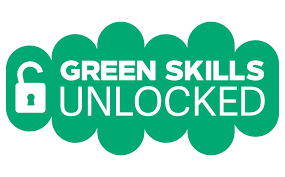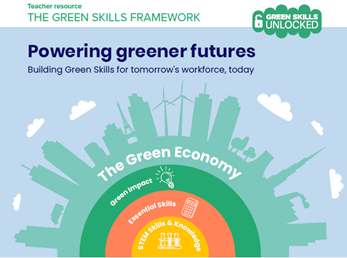ASE Evaluated for Green Skills Unlocked

Introduction

We have given an ASE Evaluated Award (Green Tick) to Energising Futures 'Green Skills Unlocked' resource. Our write up of the review is below.
Green skills are defined by the UK Parliament as “the knowledge, abilities, values and attitudes needed to live in, develop and support a society which reduces the impact of human activity on the environment”[1]. Parliament recognises that there is a lack of a standard definition of green skills, but does also recognise that schools will play a long-term role in teaching green skills, and in informing and supporting young people to enter careers that contribute to the net zero transition.
Green Skills Unlocked is a support programme for UK science teachers of 11–14 year-old students and is intended to help teachers link everyday science teaching to the green skills that young people will need to access jobs in a greening economy. It is supported by a well-constructed training course and support materials. Of great value to schools, the programme identifies school-based skills, attributes and teaching approaches that support Parliament’s definition of green skills, along with practical guidance and support for their implementation. The programme is linked to the National Curricula for all four home nations and complements other resources on the Energising Futures website.
The independent Green Jobs Taskforce report[2] identified that, by 2030, there are set to be 2 million green jobs in the UK. The Green Skills Unlocked programme supports teachers to prepare their students for future careers by focusing on transferable skills, whilst recognising that teachers are currently preparing students for jobs that don’t yet exist.
The programme is under the editorial control of We Are Futures, a brand and social impact agency that specialises in engaging and educating young people, their teachers, their parents and their communities.
Programme structure
The programme comprises an online training course, frameworks for teachers and students, progression guidance, and planning support materials that include examples of how green skills and careers connections can be introduced into existing lessons. Teachers are reassured that existing lessons are not replaced with new ones, but are augmented by linking science concepts more explicitly to green skills and green careers. The programme draws on the Science Capital Teaching Approach pioneered by Louise Archer and her team at UCL’s Institute of Education.
Enrolling on and completing the online training course allows access to all supporting programme materials, including the framework and toolkit for the classroom.
Online course structure
The Green Skills Unlocked course is hosted on the Coursera platform (www.coursera.org). This brings significant benefits for users, as the platform has a virtual coach powered by generative AI. This means that users may ask questions and request and download summaries of video transcripts and resources. However, many teachers may prefer to work through the materials without support and the structure of the course supports that approach well too.
The three-hour training programme consists of six discrete modules, each requiring from about 25 to 60 minutes to complete. Each module is further broken down into 2-4 shorter sections that typically have a video, supporting text and documents to read. Some sections also have discussion tasks that may be completed and uploaded to share with an online community. The structure very much supports a piecemeal approach to learning about green skills and would fit in well with teachers’ busy schedules. For example, a typical module section may be completed during a morning or lunchtime break. For the greatest impact within a school, the materials should be used by all members of a department. In this situation, the materials would very much support a department meeting, with participants working collaboratively through the materials and generating a shared vision for the department.
Most of the relevant files and supporting documents are hosted on the Energising Futures website and have direct download links within the text, making access straightforward and with minimal chance of broken links. There are some external websites and documents referenced.
The modules provide a progression from defining green skills right through to guidance for incorporating green skills teaching into lesson planning. The modules, along with a brief summary of their content, are:
1. What are green skills?
The overall course aims and learning intentions are shared. Green skills and the Green Skills Unlocked course are introduced by a team of experts from industry and science education.
2. The Science Capital Teaching Approach
This introduces science capital as an idea and links green skills teaching and careers firmly through the Science Capital Teaching Approach[1].
3. What does progression look like?
Progression in green skills is introduced, supported by a downloadable ‘steps-table’ and suggested teaching strategies. The session also explores challenges and barriers that teachers and students face and how they may be overcome.
4. Introducing careers into the classroom
This explores methods and resources for introducing careers into the classroom and makes links to careers resources on the Energising Futures website. It also provides support and guidance for how to add a careers hook to lessons.
5. Planning a lesson
Lesson planning is supported through modelling, co-construction and then participant planning. The session draws on learning from across all modules.
6. Closing summary
Links to all materials are provided, with a reminder of the importance of green skills to our students.
[1] The Science Capital Teaching Approach, Archer, L et al, UCL IOE.
Supporting resources

Green Skills Unlocked is well supported by several resources. The document that underpins the entire programme is the Green Skills Unlocked framework.
The framework for teachers identifies STEM skills and knowledge as fundamental: Scientific literacy, developing enquiry, critical thinking and problem-solving.
Essential skills identified are collaboration, communication, mathematical literacy and digital literacy.
Green impact skills and attributes identified are resilience, adaptability, creative thinking and adaptation and global citizenship.
The framework identifies, for teachers, how students can demonstrate these skills and attributes. There is a similar but simpler framework available for students.
The Skills progression document further exemplifies skills identified by the framework, showing increasing levels of skills and attributes across skill areas.
To support teacher planning, there are exemplar materials showing how existing resources can be adapted to incorporate green skills. There is also a quick planner that focuses teachers on key areas and features that should be incorporated into lessons.
The Green Skills Unlocked Teacher Toolkit is a one-stop shop, which contains the framework, identifies existing resources on the Energising Futures website, and provides planning support documents and curriculum links.
Conclusions
The Green Skills Unlocked programme is well thought out and resourced. It provides teachers with an approach for improving students’ science capital and motivation by making science education even more relevant to their lives and futures. As a significant proportion of students have anxiety about climate change and sustainability, resources such as Green Skills Unlocked provide them with welcome messages – that the future is greener than is often portrayed, and that skills and knowledge they gain from science education can make a difference to their future and that of the planet.
